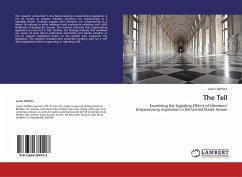The research conducted in this book examines cosponsoring legislation in the US Senate to indicate whether members use cosponsoring as a signaling device. Findings suggest that members use cosponsoring as a means to indicate to other members both preference extremity and a bill's likelihood of passing the Senate. The research indicates that cosponsoring legislation is a form of a "tell". Further, the findings indicate that members are aware of each other's preference extremities and decide whether or not to support legislation based on the people who cosponsor the legislation. The research indicates that moderate members wait for a "tell" about legislation before supporting or rejecting a bill.
Bitte wählen Sie Ihr Anliegen aus.
Rechnungen
Retourenschein anfordern
Bestellstatus
Storno








